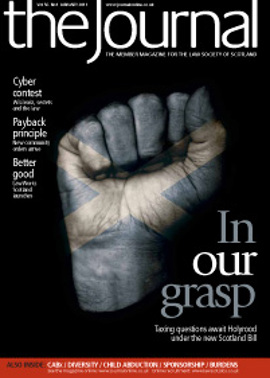Forum discusses EU contract law

On 16 December, the Society and the Scottish Government hosted a discussion seminar on the European Commission’s Green Paper on Options for Reforming Contract Law within the EU. Speakers included representatives from the business community, Scottish Government, Scottish Law Commission and the Society.
The green paper makes a number of suggestions for streamlining the differences in EU contract law. Two suggestions that no one takes seriously are (a) an EU Regulation on Contract Law that would replace all existing national contract laws, or (b) a European Civil Code. But there is one suggestion that merits serious consideration: a regulation providing for an optional instrument (“OI”) of EU contract law. Existing Scots law would be unaffected. Why then introduce such an additional OI?
Suppose a Scottish company contracts with a Polish company. Neither party wants the contract to be governed by the law of the other’s country. One possibility is to choose the law of a third country (such as English law). But another solution, not presently possible, is that the parties choose a neutral, non-state-specific system. An OI would be based on the contractual provisions of the so-called Draft Common Frame of Reference (the “DCFR”). One of the influential drafters of the DCFR is Professor Eric Clive.
Another situation where an OI would be useful is that of consumers and small businesses contracting with an online retailer such as Amazon. Amazon does not wish to contract subject to the laws of each legal system in the EU. At present – and this may come as a shock – all contracts with Amazon are subject to the law of Luxembourg (whether a Scottish court would regard such a term as “fair” under the Unfair Terms in Consumer Contracts Directive is another matter). An OI would allow all such online contracts to be subject to a standard European code as presently found in the DCFR.
It seems highly unlikely that such an OI would be used to govern bespoke corporate and commercial contracts. But the option would be there.
Laura Macgregor of Edinburgh University, in a report to the Scottish Government (www.scotland.gov.uk/ Publications/2009/03/05095249/0), has pointed out that “Potentially, Scots law resembles the DCFR more than any other European member state resembles the DCFR.” There would therefore be little to fear for Scots lawyers in terms of the content of the DCFR. But there are some other important concerns. One is certainty. At the outset practitioners would find it difficult to advise on how the terms would be interpreted. Another is that, if the EU Court of Justice is to be the final arbiter, the resolution of any interpretative questions on basic points of contract law would be the subject of inordinate delay.
Ross Anderson, convener, Obligations Subcommittee
In this issue
- Prison accommodation for transgender people
- Challenge of the new
- An issue that will not die
- Revolution in the making
- Sasine service
- The welfare imperative
- War on the web
- Payback time
- Diverse means
- Good and better
- Help where it's needed
- Appreciation: Elaine Tyre
- Forum discusses EU contract law
- Law reform update
- Time to take the plunge?
- Ask Ash
- Money talking
- Cut the risk of harm
- Trust rewritten
- Promoting responsibility
- Fathers made relevant
- Tread warily: habitats
- Forum at the frontiers
- Website review
- Book reviews
- Signs of the times






